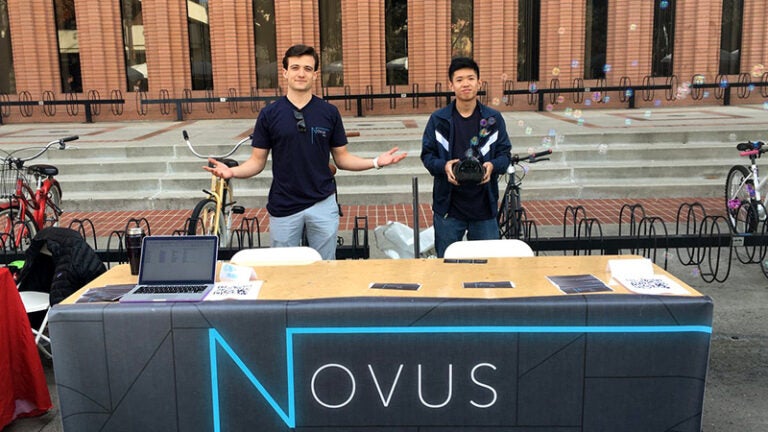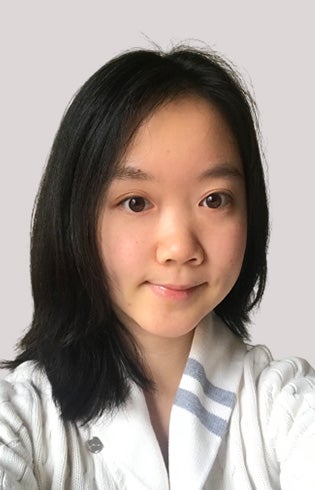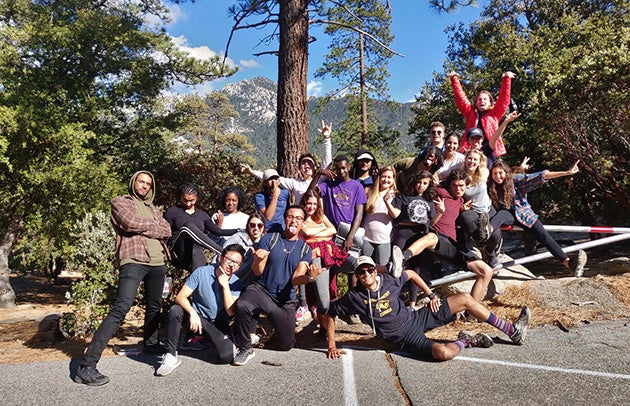
Student-led think tank addresses pressing problems beyond the university walls
Among USC’s pantheon of prestigious and well-known student organizations — some that date back to the 1800s — Novus Think Tank is one of the standouts. Ask a member to describe the organization, founded in 2014, and you’re apt to get similar variations of a lofty, erudite mission statement about furthering human progress and building flourishing communities. But one recent alumnus, who says the group changed his notion of what it means to “live a good life,” is more direct.
“We’re a community of students trying to apply what we’re learning in class to the problems we care about in the real-world — and we’re really intentional about building a strong community, too,” said Rohan Menon, a neuroscience major who graduated from the USC Dornsife College of Letters, Arts and Sciences last year and remains involved with Novus.
As a senior, Menon developed the organization’s first formalized curriculum while a research assistant in USC Dornsife’s Brain and Creativity Institute (BCI) with Mary Helen Immordino-Yang, professor of education, psychology and neuroscience.
“There is only one requirement to join Novus: You have to [care] about something,” Menon said. “That’s it. If you really care about a problem or issue out in the world, then this is the place for you.”
Students who care about the state of the world

As a freshman attending USC’s virtual Involvement Fair last fall from her family home in Cupertino, California, Jasmin Wang was simply hoping to find an organization that could connect her with other students who share her passion for social justice.
She found much more in Novus: a diverse, tight-knit group that welcomed her as one of its leaders, with an opportunity to work on a cause she’s passionate about.
Wang, who is double-majoring in neuroscience and psychology at USC Dornsife, cares deeply about combating power-based harm, which is the abuse that happens when someone uses power, control or intimidation to hurt another. “They made it really clear from the start that if there’s something you feel really passionate about … then they will support you as best as they can. And that was really real,” she said.
The newly created power-based harm team is developing plans for a prominent Los Angeles mural to heighten awareness of the issue and spotlight how it affects the indigenous community, which is often overlooked by the public and policymakers.
“Here at USC, we have the education and the resources to take action instead of futilely complaining about all of the issues we see,” she said.
Novus, which meets every week (via Zoom, since the start of the COVID-19 pandemic), has helped Wang not only feel more connected to the university that she’s only visited once, it has helped her develop a network of students she’s excited to meet on campus.
“I have friend crushes on everyone, basically. They’re all really smart, really nice, really passionate, just genuinely, really good people that I want to be around.”
Wang’s experience is exactly what Max Henning envisioned for members when he founded Novus as a junior at USC Dornsife majoring in neuroscience.
“I was mostly just desperate to find other young people who were serious about building long-term solutions to the problems we all face,” said Henning, who continues to advise Novus while working as a research assistant to BCI Director Antonio Damasio.
“A lot of the potentially existential challenges to modern society are going to come to a head during our lifetimes,” Henning said. “I want us to live our golden years in a better, happier, calmer world. But we have our work cut out.”
A think tank is born
The origins of Novus can be traced to a hopeful email he sent to a group of students. In it, he says he wrote something like, “I’m going to be in the courtyard on Wednesday for an hour talking about current events and big problems that need solving. If anybody wants to come, I would love to chat with you. If not, I’ll just read the news on my own.”
Four or five Trojans showed up. Soon, thanks to positive word-of-mouth, and to professors who referred “stand out” students who might be interested, it evolved into a demographically diverse, modern-day salon.
“We had writing majors. Physics majors. Engineers. Designers. I was in neuroscience. We had philosophy, politics and law students,” said Henning. “The conversations were electric because people came from all of these different angles.”

That’s when the students realized they had essentially formed a think tank. And that rather than just discussing issues of importance to them, they could use their education and passion to collectively address those issues.
For USC Dornsife alumnus Isaac Gilles ’19 (Philosophy, Politics, and Law), USC’s first Student Coordinator of Belonging, it was the integration of problem-solving projects with humanist ideals that was particularly appealing. “Novus put into practice something that I was looking for but didn’t have the words to describe yet,” he said. “An understanding of human feeling and emotion that suggests that we can — and should— work within meaningful communities to pursue the goal of human flourishing.”
The organization’s commitment to community-building is reflected in its organizational structure. Rather than a single president, it has an executive board that needs to reach consensus on all major decisions and several directors who lead specific tasks and projects. On issues big and small, leaders work to ensure that the perspectives of all members are integrated into decision-making.
The projects have included mitigating political polarization, through a newsletter that attempts to help readers see divisive issues from a different perspective, to tackling student loneliness by amplifying diverse Trojan voices through the group’s InsightUSC blog. They also created The Wrigley Institute Ambassadors Program, which brings students throughout the university to USC Dornsife’s Wrigley Marine Science Center on Catalina Island to learn about sustainability.
One of the projects that particularly stands out for Henning is an initiative at an underserved South Los Angeles high school around the corner from USC’s University Park campus. Emmanuel Carrera Ruedas ’20, who himself graduated from a nearby high school and was a first-generation college student at USC Dornsife, led the project.
“Emmanuel and the education committee developed a program, based on his experience in a similar setting, to strengthen the social and emotional foundations for students at that school,” said Henning. “Many of these kids hadn’t ever felt truly valued by society, so the education team ran a one-on-one discussion and journaling workshop about how their lived experiences of adversity give them a first-hand insight into social problems that sets them apart from even their most well-resourced peers.”
“Several kids said that it was one of the first times they really felt that they had something to offer. The feedback we heard was incredible.”
Lasting bonds among Trojans
The bonds formed among Novus members are so strong that many alumni, like Megan Hansford, remain involved with the organization, advising on student projects and helping with professional networking. “It was impossible to not be engaged by the people who surrounded me at meetings,” she said, “The minds that came together… the ideas that came forth from those minds.”
Now a research manager for a financial consulting firm, Hansford graduated from USC Dornsife with a double-major in neuroscience and English in 2018. She credits the organization with giving her greater confidence and helping her succeed in her career. “I don’t think I would be in a position of leadership in my workplace if it wasn’t for Novus.”